
Smile the way you like
it is possible
Dental veneers in Marbella, if you want to improve the appearance of your smile and recover your confidence, dental veneers may be the solution you are looking for. Dr. Bruno Pereira is an international reference in the field of dental aesthetics and offers veneers treatments that can help you achieve the smile you’ve always wanted.
What are dental veneers?
Dental veneers are thin, tooth-coloured shells that are permanently bonded to the front surface of your teeth to improve their appearance. They are an ideal solution for aesthetic problems such as chipped, broken, discoloured or smaller than normal teeth. Veneers can be made of porcelain or composite resin materials, each with unique benefits.
Why Choose Dr. Bruno Pereira for Your Veneers?
Trained in the United States and a visiting professor at New York University, Dr. Bruno Pereira brings a wealth of knowledge and experience to his clinic in Marbella. He is a world lecturer on facial and dental aesthetics and a consultant for a US company with revolutionary technology. His clinic, located in Marbella, is equipped with state-of-the-art technology, ensuring that you receive the best possible care.
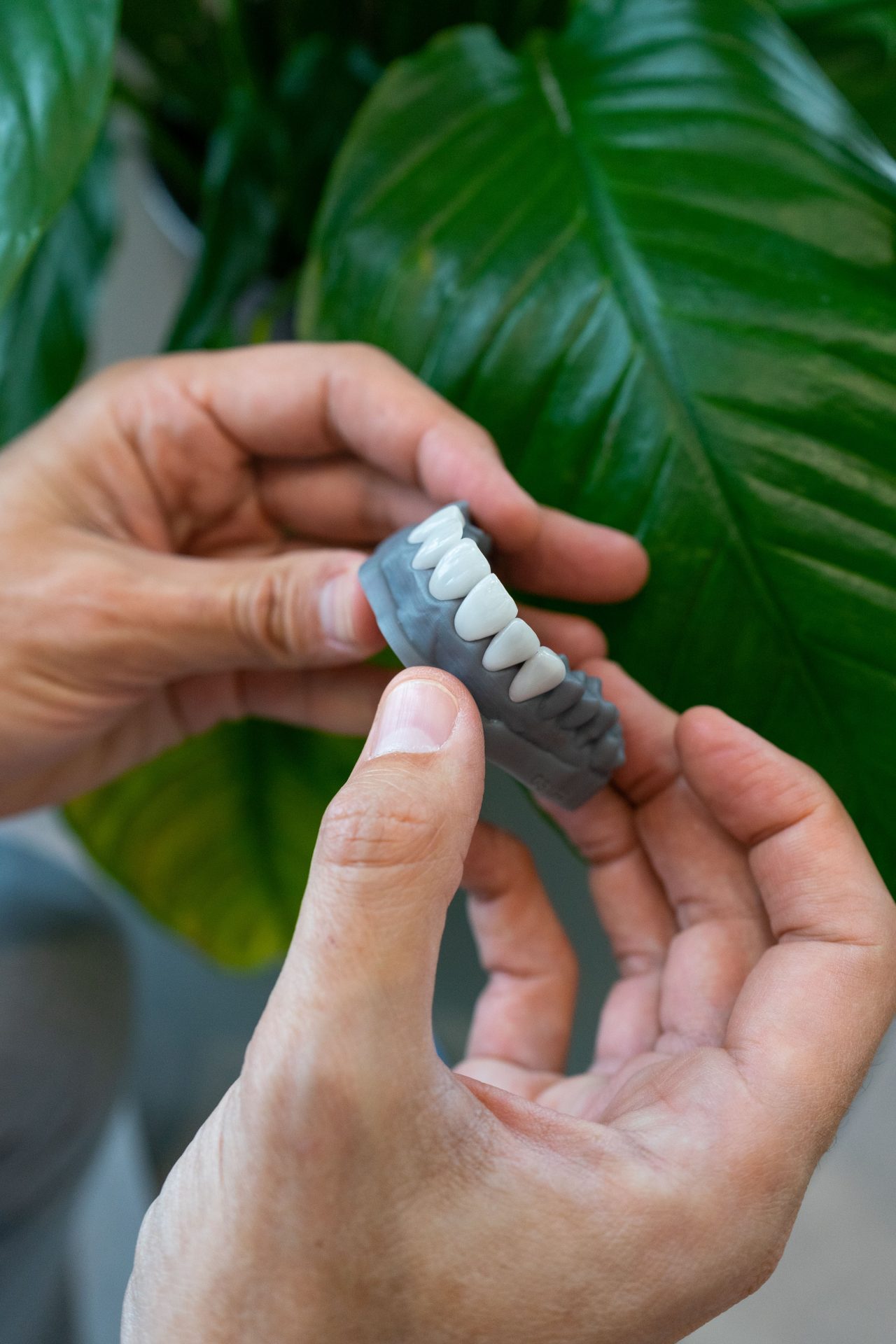
Dental veneers in Marbella:
A Lasting Solution
Composite veneers have an average life span of approximately 5 years. However, this duration can vary considerably depending on whether the patient is a smoker and how well they care for their veneers. It is important to note that composite veneers require annual polishing to maintain their optimal appearance and functionality.
Porcelain veneers, on the other hand, last on average 15 to 20 years. Unlike composite veneers, porcelain veneers do not need to be replaced over time, which means they do not have a set expiry date. This is because porcelain is a highly resistant and durable material.
your dental veneers in marbella in only 4 appointments
Get a radiant smile in only 4 appointments! With our dental veneers treatment, you can have the smile you’ve always wanted easily, quickly and painlessly.

1. Aesthetic Study
At the first appointment, our team of experts will carry out an exhaustive aesthetic study of your teeth and smile. We will assess the shape, colour and alignment of your teeth to understand your aesthetic needs and goals. We will use advanced technology to obtain detailed images of your teeth to design the ideal veneers for you.
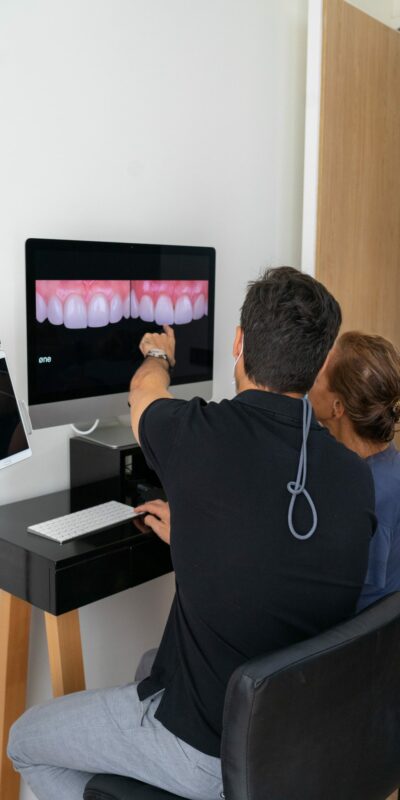
2. Result Simulation
At the second appointment, we will give you a unique experience by performing a simulation in your mouth of the expected result. Using the latest techniques, we will be able to show you what your smile will look like after veneers. This simulation will allow you to visualise and approve the result before proceeding with the treatment.
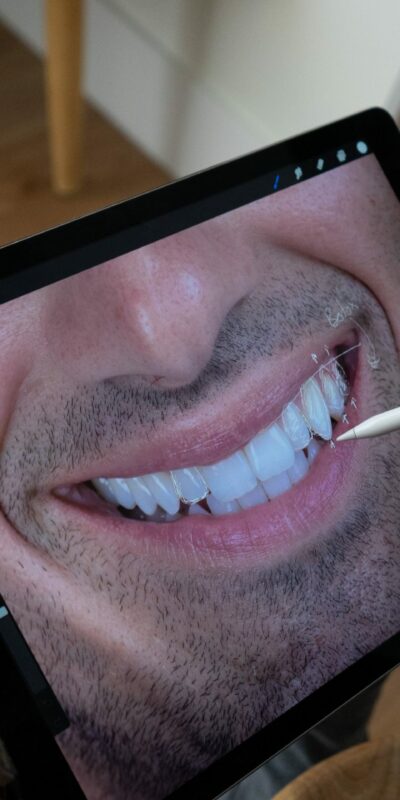
3. Preparation
At the third appointment, we will focus on preparing your teeth for veneers. Our specialists will carefully remove a small amount of tooth enamel to ensure a perfect fit of the veneers. We will provide you with a comfortable and pain-free treatment.

4. Placement
On the fourth and final date, the long-awaited moment arrives. Our talented team of professionals will carefully place the veneers on the front of your teeth. We will use high quality dental adhesives to ensure a durable and strong bond.
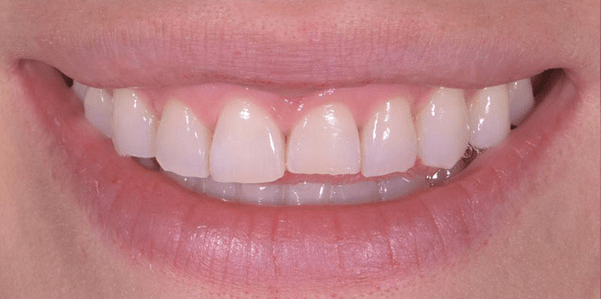
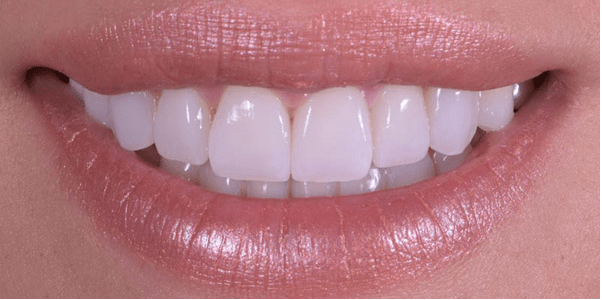
READY FOR YOUR NEW TRANSFORMATION?
Whether you are in Marbella, Costa Del Sol or anywhere in Malaga, Dr. Bruno Pereira is ready to transform your smile with dental veneers. Contact us today to start your journey to a more confident and captivating smile.
I want to find out moreTestimonials
What our patients say
EXCELENTETrustindex verifica que la fuente original de la reseña sea Google. Lo Mejor!Publicado enTrustindex verifica que la fuente original de la reseña sea Google. Having lived for 5 years in Marbella, Dr Bruno Pereira is most likely the best dentist in the city. He has worked to perfection on my smile and dental esthetics. Habiendo vivido durante 5 años en Marbella, el Dr. Bruno Pereira es probablemente el mejor dentista de la ciudad. Ha trabajado a la perfección en mi sonrisa y estética dental.Publicado enTrustindex verifica que la fuente original de la reseña sea Google. Competência, qualidade e dedicação, num trabalho personalizado que seguramente faz a diferençaPublicado enTrustindex verifica que la fuente original de la reseña sea Google. I can't say enough great things about my dentist located in Marbella, Dr. Bruno Pereira, who specializes in aesthetics! Dr. Bruno Pereira is a true artist when it comes to crafting smiles. Their attention to detail and passion for their work were evident from the first consultation. He took the time to understand exactly what I wanted and provided me with personalized treatment with dental veneers. I highly recommend Dr. Bruno Pereira to anyone seeking exceptional aesthetic dental care. Their expertise, professionalism, and warm demeanor make them the best in the business.Publicado enTrustindex verifica que la fuente original de la reseña sea Google. What a great experience! During my vacation in Marbella I had an appointment with Dr Pereira regarding a dental problem. After that, all my family is followed by Dr Pereira.Publicado enTrustindex verifica que la fuente original de la reseña sea Google. Enorme qualidade. Trata-se de um profissional experiente e de grande competência. Excelente atendimento. Recomendo vivamente. Bruno Pereira, estética dental, carillas dentales, sonrisa, dentista Marbella_Publicado enTrustindex verifica que la fuente original de la reseña sea Google. Nuestra experiencia ha sido más que grata, desde la atención, la profesionalidad, el carácter multidisciplinar y sin duda la experiencia , (tras atravesar por varias clínicas en Marbella ) puedo confirmar que es mejor dentista, minucioso y sobre todo profesional , que he conocido .Publicado enTrustindex verifica que la fuente original de la reseña sea Google. Dr Bruno Pereira is the best when it comes to veneers. I went to see him in Marbella and I'm impressed with his professionalism and his work in general. Really happy to recommend this top specialist for dental veneers and other aesthetic treatments.
Recover confidence in your smile
Your dental veneers treatment in Marbella from the hand of a reference in dental aesthetics, Dr. Bruno Pereira.
Frequently Asked Questions (FAQs)
- General
- Cost
- Fears
- Durability
- Process
- Maintenance
- Result
Dental veneers are ideal for correcting mild dental alignment, but are not the right solution for severe cases of misalignment. They are sometimes combined with orthodontic treatment to achieve better results. It is important to seek guidance from an experienced veneer specialist.
It may be necessary to lightly polish the tooth in order to hide the bond line with the veneer. Dental veneers are bonded onto the enamel and it is virtually impossible to remove a veneer without scratching the tooth. This is why it cannot be said to be fully reversible.
Dental veneers are porcelain or composite veneers that are bonded to teeth to improve their appearance. They cover imperfections such as stains, wear and malformations, and improve the size, shape and colour of teeth. They require a fitting process and with proper care will last for years.
If you clench your teeth, it is important to control this, as it increases the risk of fracture of the veneers but also of the teeth. Veneers can be placed in these cases, however, it is essential to consult an experienced specialist. In these cases it is extremely important to have bite checks.
In general, dental insurance does not cover aesthetic treatments. However, if it is a health issue, such as teeth that are defective in some way, it may be possible to obtain insurance cover. It is important to consult a specialist dentist in this type of case.
The decision as to whether you are a good candidate for dental veneers will depend on several factors, such as the current condition of your teeth and your aesthetic needs. In general, dental veneers may be a good option if you have: Stained or discoloured teeth: Dental veneers can hide stains and discolourations on your teeth that cannot be removed by teeth whitening. Misaligned or slightly crooked teeth: If your teeth are slightly misaligned or crooked, dental veneers can correct their appearance without the need for orthodontics. Chipped, broken or worn teeth: Dental veneers can restore defects in teeth and improve their appearance. Gaps between teeth: If you have gaps between your teeth, dental veneers can close them and improve the appearance of your smile. It is if you have serious dental problems, such as cavities, periodontal disease or weak teeth, you should first treat these problems before considering dental veneers. In addition, if you have habits such as clenching or grinding your teeth, your dentist may recommend other treatments before considering dental veneers. It is important to schedule a consultation with a dentist experienced in the placement of dental veneers to determine if you are a good candidate for this procedure and to discuss your treatment options.
The cost of dental veneers depends on the material used and the type of case. In Spain the price of dental veneers can vary between 300 and 1500 euros per tooth. It is important to understand the materials used whether it is composite or ceramic.
Porcelain veneers cost more than composite veneers because of their durability and more natural look. Porcelain veneers can cost between 500 and 1,500 euros per tooth, while composite veneers usually cost between 300 and 1,000 euros.
The price of dental veneers does not include aftercare, so it is essential to maintain good oral hygiene and visit the dentist regularly to ensure their longevity. Some clinics offer maintenance plans with regular check-ups and cleanings, although this varies from case to case.
Veneer replacement costs between 300 and 1000 euros per tooth, depending on the type of material used and the complexity of the work required. It is important to consider that dental veneers require regular maintenance to avoid premature replacement and to prolong their durability.
A dental veneer can be much more expensive (800-2.000€) than the price of a veneer as part of a treatment of 10 veneers (5000-10000€). The reason is that when a single veneer is made, it has to be customised so that it copies the other teeth perfectly.
Yes, most dental clinics offer financing options for dental veneer treatments. These options may vary from clinic to clinic and may include payment plans in instalments or financing through external financial institutions. Check with your clinic for available financing options.
In some cases, dental insurance may be used to cover part or all of the cost of dental veneers. However, this depends on the specific coverage and the specific case. It is advisable to consult a dentist to assess your case and learn about the options available.
The process of placing veneers is generally painless, as local anaesthesia is used. However, there may be a feeling of discomfort or sensitivity in the teeth after veneers are placed, especially in the first few days. This is normal and usually resolves itself.
After dental veneers are placed, it is possible to experience temporary sensitivity that usually lasts a few days or weeks. The duration of sensitivity varies and depends on the amount of tooth preparation required. It is important to follow the recommendations and avoid hot or cold foods and drinks during this time.
Dental veneers do not damage teeth. In some cases, minimal preparation may be necessary to create space for the veneer or to hide the bond of the veneer to the tooth. It is important to consult an experienced dentist to minimise risks.
The most frequent complications of composite veneers are staining and fracture. With porcelain veneers, tooth sensitivity may occur during the first few days. These veneers are more resistant to fracture or chipping and do not discolour over time. It is very important to choose an experienced dentist.
No, during the fitting of dental veneers it is completely painless. Local anaesthesia may also be administered to minimise any pain or discomfort during the procedure.
Well-executed dental veneers do not cause problems, but improper placement can lead to tooth sensitivity, excessive tooth wear, bleeding gums, discolouration under the veneers and unsatisfactory results. It is crucial to choose an experienced and well-trained professional to ensure the success of the treatment.
The preparation process for veneers begins with the removal of a small amount of enamel to create space for the veneer. A dental impression is then taken to create a customised veneer. Before the veneer is placed, the tooth is cleaned, polished and proper bonding is ensured.
Composite veneers last on average 5 years, depending on the patient’s smoking habits and care, and require annual polishing. Porcelain veneers last on average 15 to 20 years, they do not need to be replaced after a certain period of time, i.e. they do not have an expiry date.
Yes, porcelain veneers are more durable than composite veneers due to their stronger material. Porcelain veneers are less likely to fracture or stain and can last up to 20 years. However, it depends on the proper care and maintenance of the veneers.
To prevent damage to dental veneers, good dental hygiene is recommended, avoid biting hard objects and do not open objects with your teeth. In addition, it is important to visit the dentist regularly and to wear a mouth guard in contact sports. Habits such as nail biting or pencil biting should also be avoided.
Some dentists offer a guarantee on dental veneers. The duration of the guarantee may vary depending on the dentist and the type of veneer used. It is important to discuss warranty details with your dentist before proceeding with veneers.
Good oral hygiene and daily flossing are necessary to care for dental veneers. Periodic bite checks should be carried out. Ideally, a sleep splint should be worn to prevent material fatigue fractures and any movement of the teeth.
Composite veneers are stained by the consumption of coffee, tea, red wine, tobacco… Porcelain veneers do not stain over time, however the area where they are bonded to the tooth or the tooth itself may stain over time. This is why it is so important to hide the junction area.
The process for placing dental veneers varies from patient to patient, but in general the main steps are as follows: Initial Consultation: In this first appointment, the cosmetic dentist evaluates the condition of the patient’s teeth and discusses the aesthetic goals he or she wishes to achieve. And collect photographs, videos and 3D scanner to make the smile design Mockup: This appointment consists of placing in the mouth a simulation of the final veneers in a resinous material. It gives the patient a rough idea of the possible final result before treatment begins. This is a key appointment to discuss the patient’s expectations except in cases where it is not possible to do so. Dental preparation: the teeth are prepared for veneers. The dentist will remove a small amount of enamel from the teeth to create space for the veneers and to hide the bond of the veneer to the tooth. Next, a 3D scan of the prepared teeth will be taken to create the custom veneers in the laboratory. Temporary veneer placement: While the custom dental veneers are being fabricated, temporary veneers with the final design will be placed to protect the teeth. Placement of the final veneers: the final custom veneers will be placed by means of an adhesive It is important to note that the exact process of placing dental veneers may vary depending on the needs of each patient and the recommendations of the specialist dentist.
Before dental veneers are placed, diagnostic tests are carried out to determine if you are a suitable candidate for the smile design. These tests may include photographs, video, facial scans, x-rays, examinations of the health of the gums and teeth, and 3D scans of the patient’s mouth.
The treatment of dental veneers usually requires 4 appointments separated by a week, although this time can be shortened if planned in advance (consultation process). The preparation and fitting of 10 veneers can take up to 3 hours, other appointments are usually shorter.
Basically there are two types porcelain/ceramic or composite. Porcelain veneers are more durable and stain resistant, but they are more expensive and require more time for placement. Composites are cheaper but are less durable and prone to staining and fracture.
Porcelain and composite veneers do not damage natural teeth if placed properly. Preparation of the tooth for veneers may involve the removal of enamel. It is essential to follow the dentist’s instructions and make regular visits to keep the veneers in good condition.
There is no specific type of veneers without touching the teeth. There are cases, where the teeth are small or there are gaps, where it is possible to make veneers without touching the teeth. If the teeth are the ideal size, veneers without touching the teeth can result in very large and disproportionately sized teeth.
Porcelain or ceramics are the same. They are stronger and more durable than composite. Composite veneers are cheaper but less durable and may stain over time. The choice of material depends on the needs, preferences of the patient and the individual case.
Dental veneers cannot be whitened, however the teeth that support them can be whitened. It is not an easy method, but it is possible. It is important that you discuss with your dentist the desired color before placing the veneers, once placed, their color cannot be changed.
After veneers are placed, it is important to maintain good oral hygiene and avoid biting objects. It is essential to attend regular check-ups with the dentist to check the bite. It is recommended to use a night splint to avoid fractures and mouthguards if contact sports are practiced.
The cost of veneer maintenance varies according to the material and the needs of each patient. Regular dental check-ups and good oral hygiene are recommended. Veneers may need adjustment or replacement if they become damaged or worn over time.
Dental veneers should be brushed carefully with a soft brush and non-abrasive toothpaste. It is necessary to brush on all surfaces, including the gum line and edges. Whitening toothpaste should be avoided.
The colour of dental veneers should be chosen according to the shade of the patient’s natural teeth, skin colour, age, lip type, gender and personal preference.
Once dental veneers are in place, they look like natural teeth. The colour, shape and size of the veneers are matched to the patient’s mouth and smile. They significantly improve the appearance of teeth and provide a satisfying and long-lasting result.
Dental veneers can be customized in colour, shape and size to suit the individual needs of each patient to achieve the desired result. It is essential to have an experienced and skilled dentist to achieve a natural and harmonious result.
Yes, it is possible and it is highly recommended to see the final result before veneers are placed. Ideally, a mock-up should be made in the mouth to simulate the final result, but if this is not possible, a photo simulation can be used.
Yes, dentists can use simulation tools to show what dental veneers will look like before they are placed. This helps patients visualise the final result and ensure that they are satisfied with the appearance of the veneers before proceeding with treatment.
If you are unhappy with the result of your dental veneers, you should speak to your dentist as soon as possible so that any problems can be resolved. In some cases, it may be possible to adjust or replace veneers to achieve the desired result.

